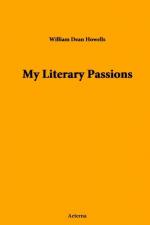I was not sorry, for I believe I never went in or came out of the place, by day or by night, without a shudder, more or less secret; and at least, now, we should be able to get another house.
XII. OSSIAN
Very likely the reading of Ossian had something to do with my morbid anxieties. I had read Byron’s imitation of him before that, and admired it prodigiously, and when my father got me the book—as usual I did not know where or how he got it—not all the tall forms that moved before the eyes of haunted bards in the dusky vale of autumn could have kept me from it. There were certain outline illustrations in it, which were very good in the cold Flaxman manner, and helped largely to heighten the fascination of the poems for me. They did not supplant the pastorals of Pope in my affections, and they were never the grand passion with me that Pope’s poems had been.
I began at once to make my imitations of Ossian, and I dare say they were not windier and mistier than the original. At the same time I read the literature of the subject, and gave the pretensions of Macpherson an unquestioning faith. I should have made very short work of any one who had impugned the authenticity of the poems, but happily there was no one who held the contrary opinion in that village, so far as I knew, or who cared for Ossian, or had even heard of him. This saved me a great deal of heated controversy with my contemporaries, but I had it out in many angry reveries with Dr. Johnson and others, who had dared to say in their time that the poems of Ossian were not genuine lays of the Gaelic bard, handed down from father to son, and taken from the lips of old women in Highland huts, as Macpherson claimed.
In fact I lived over in my small way the epoch of the eighteenth century in which these curious frauds found polite acceptance all over Europe, and I think yet that they were really worthier of acceptance than most of the artificialities that then passed for poetry. There was a light of nature in them, and this must have been what pleased me, so long-shut up to the studio-work of Pope. But strangely enough I did not falter in my allegiance to him, or realize that here in this free form was a deliverance, if I liked, from the fetters and manacles which I had been at so much pains to fit myself with. Probably nothing would then have persuaded me to put them off permanently, or to do more than lay them aside for the moment while I tried that new stop and that new step.
I think that even then I had an instinctive doubt whether formlessness was really better than formality. Something, it seems to me, may be contained and kept alive in formality, but in formlessness everything spills and wastes away. This is what I find the fatal defect of our American Ossian, Walt Whitman, whose way is where artistic madness lies. He had great moments, beautiful and noble thoughts, generous




